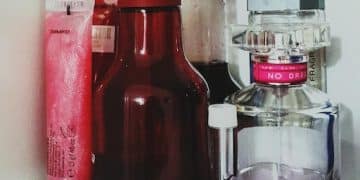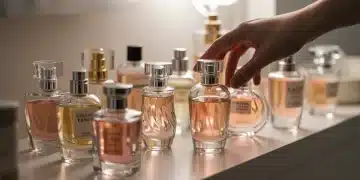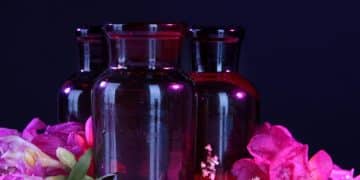Is Your Perfume Expired? 2025 Guide to Longevity & Storage
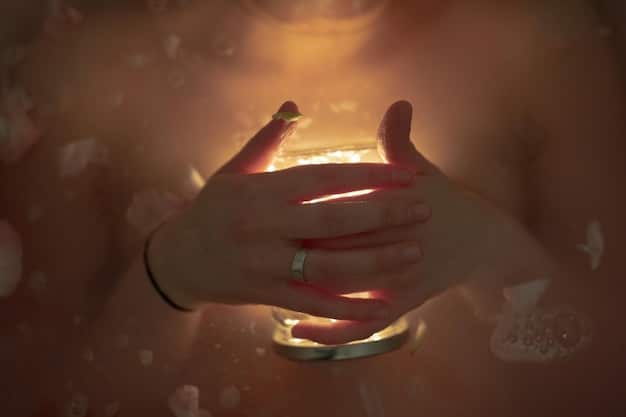
Anúncios
Is Your Perfume Expired? A 2025 Guide to Fragrance Longevity and Storage in the US: Discover the signs of perfume expiration, learn expert storage tips, and understand how to extend the life of your favorite scents in our comprehensive 2025 guide.
Anúncios
Do you ever wonder if that expensive perfume you splurged on is still good to use? Figuring out **Is Your Perfume Expired? A 2025 Guide to Fragrance Longevity and Storage in the US** can be tricky, but this guide will help you keep your favorite scents fresh for years to come.
Decoding Perfume Expiration: What to Look For
Determining whether **Is Your Perfume Expired? A 2025 Guide to Fragrance Longevity and Storage in the US** involves a keen observation of both the scent and the physical characteristics of the perfume itself. Understanding these telltale signs can save you from using a degraded fragrance that no longer delivers the intended experience.
Anúncios
Changes in Scent
One of the most obvious indicators of perfume expiration is a noticeable change in its scent profile. This could manifest as a sour, metallic, or off-putting odor that wasn’t present when the perfume was new.
Visual Clues: Color and Clarity
Another way to tell if **Is Your Perfume Expired? A 2025 Guide to Fragrance Longevity and Storage in the US** is by looking at the color and clarity of the liquid. Perfumes can darken or become cloudy as they age, which is a sign that the chemical compounds are breaking down.
- Color shift: Check if the perfume’s color has deepened or changed.
- Sediment: Look for particles or cloudiness in the liquid.
- Oily residue: Notice if the perfume leaves an unusual oily residue after spraying.
Ultimately, recognizing the signs of perfume expiration involves paying close attention to both the olfactory and visual cues, ensuring that you’re using fragrances at their optimal quality.
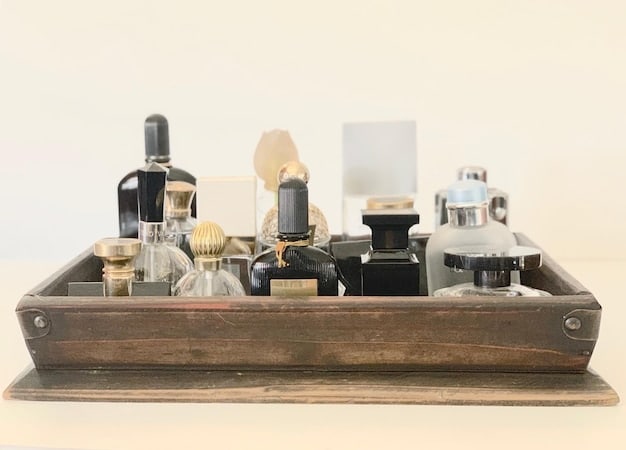
The Science of Scent: Understanding Perfume Composition
To truly grasp how **Is Your Perfume Expired? A 2025 Guide to Fragrance Longevity and Storage in the US**, it’s essential to understand the basic science behind perfume composition. The ingredients and their interactions play a significant role in determining how long a fragrance will last and how it will change over time.
Key Ingredients and Their Roles
Perfumes are complex mixtures, primarily composed of fragrance oils (natural or synthetic), alcohol, and sometimes water. Each component contributes to the overall stability and longevity of the fragrance.
How Ingredients Interact and Degrade
The interaction between these ingredients and environmental factors directly impact **Is Your Perfume Expired? A 2025 Guide to Fragrance Longevity and Storage in the US**. Exposure to light, heat, and air can trigger chemical reactions that degrade the fragrance molecules. Oxidation, hydrolysis, and polymerization are common reactions that lead to changes in scent and appearance.
- Oxidation: Exposure to air can cause fragrance oils to oxidize, leading to a sour or metallic smell.
- Hydrolysis: Water content in some perfumes can react with fragrance molecules, causing them to break down.
- Polymerization: Certain molecules can combine to form larger compounds, which can change the perfume’s viscosity and scent.
Understanding the science behind perfume composition and degradation processes empowers you to make informed decisions about storing and using your fragrances, maximizing their shelf life and preserving their intended scent profile.
Optimal Storage Techniques: Preserving Your Fragrance Investment
Proper storage is crucial for preserving your fragrance investment and ensuring that **Is Your Perfume Expired? A 2025 Guide to Fragrance Longevity and Storage in the US** is a concern you can minimize. By adhering to optimal storage techniques, you can significantly extend the lifespan and maintain the integrity of your favorite scents.
The Enemies of Perfume: Light, Heat, and Humidity
Light, heat, and humidity are the primary enemies of perfume. Exposure to these elements can accelerate the degradation process, causing the fragrance to lose its complexity and appeal.
Best Practices for Perfume Storage
To protect your perfumes from these damaging factors, follow these best practices:
- Keep perfumes in a cool, dark place: Store your fragrances in a drawer, closet, or cabinet away from direct sunlight and heat sources.
- Maintain a stable temperature: Avoid storing perfumes in areas with fluctuating temperatures, such as bathrooms or near windows.
- Control humidity: Store perfumes in a dry environment to prevent hydrolysis.
By following these simple yet effective storage techniques, you can create an ideal environment for your perfumes, preserving their quality and extending their lifespan.
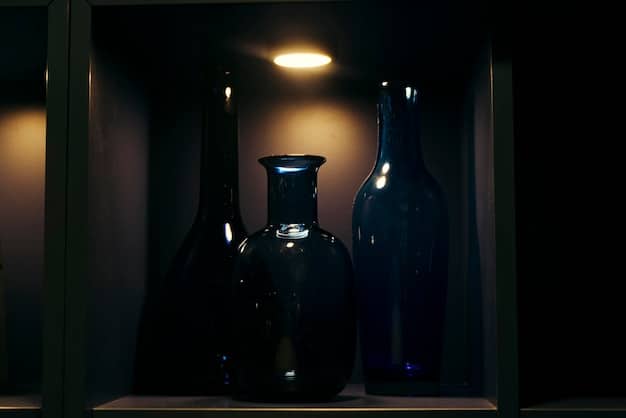
Extending Perfume Lifespan: Tips and Tricks for 2025
While optimal storage is crucial, there are additional strategies you can employ in 2025 to further extend the lifespan of your perfumes and maintain their exquisite scent profiles. These tips and tricks go beyond basic storage and delve into handling and usage techniques.
Proper Handling Techniques
How you handle your perfume can also impact its longevity. Avoid shaking the bottle vigorously, as this can introduce air and accelerate oxidation. Also, ensure your hands are clean before handling the bottle to prevent contamination.
Smart Usage Habits
Adopting smart usage habits can further prolong the life of your perfumes:
- Apply perfume after showering: Clean, moisturized skin provides a better base for fragrance, allowing it to last longer.
- Avoid rubbing perfume into the skin: Rubbing can break down the fragrance molecules and alter the scent profile.
- Layer your fragrances: Using complementary scented products can enhance and extend the longevity of your perfume.
Advanced Preservation Methods
Consider these:
- Using inert gas sprays: Products like nitrogen or argon sprays can displace air in the bottle, mitigating oxidation.
- Investing in specialized storage containers: Vacuum-sealed or UV-protective containers can provide an extra layer of protection.
By incorporating these advanced preservation methods into your routine, you can ensure that your perfumes remain fresh, vibrant, and true to their intended scent profiles for years to come.
The Role of Atomizers and Packaging: Protecting Your Scent
The design of perfume packaging and the functionality of atomizers play a significant role in protecting your scent and preventing **Is Your Perfume Expired? A 2025 Guide to Fragrance Longevity and Storage in the US** from becoming a frequent worry. Understanding these elements can help you make informed choices when purchasing and maintaining your perfumes.
Atomizers and Their Impact
Atomizers, the spray mechanisms on perfume bottles, are crucial for dispensing fragrance evenly and preventing excessive air exposure. High-quality atomizers create a fine mist, reducing the risk of oxidation and contamination.
The Significance of Packaging
The packaging of a perfume serves as a protective barrier against light, heat, and air. Dark-colored or opaque bottles offer better protection compared to clear ones.
- Material matters: Glass is generally superior to plastic, as it’s less permeable and doesn’t interact with the perfume’s chemical composition.
- Sealed bottles: Perfumes with tightly sealed caps prevent air from entering and degrading the fragrance.
- Protective boxes: Keeping perfumes in their original boxes provides an additional layer of protection against light and temperature fluctuations.
Considering the role of atomizers and packaging when purchasing and storing your perfumes can significantly contribute to their longevity and overall quality, ensuring that your favorite scents remain fresh and vibrant for years to come.
Recognizing Reformulations: How Perfumes Change Over Time
Understanding how perfumes change over time, especially due to reformulations, is essential for any fragrance enthusiast. Knowing what to look for can help you anticipate **Is Your Perfume Expired? A 2025 Guide to Fragrance Longevity and Storage in the US** and maintain your collection effectively.
What is Perfume Reformulation?
Perfume reformulation involves altering a fragrance’s original composition, often due to ingredient availability, cost considerations, regulatory changes, or evolving consumer preferences.
Spotting the Signs of Reformulation
Detecting a reformulation can be challenging, but subtle cues can indicate a change:
- Scent profile: Notice if the fragrance smells different or lacks the same depth and complexity as the original.
- Longevity: Reformulated perfumes may not last as long on the skin.
- Packaging changes: Manufacturers sometimes update packaging to reflect a reformulation.
Impact on Fragrance Longevity
Reformulations can impact **Is Your Perfume Expired? A 2025 Guide to Fragrance Longevity and Storage in the US** in various ways. Changes in ingredients or concentrations can affect the perfume’s stability, longevity, and overall scent profile. Knowing about potential reformulations helps you manage your collection and maintain your favorite fragrances.
| Key Point | Brief Description |
|---|---|
| 👃 Scent Changes | Sour, metallic, or off-putting odors indicate expiration. |
| 🌡️ Storage | Store perfumes in a cool, dark place with stable temperatures. |
| 🧴 Handling | Avoid shaking the bottle vigorously and apply perfume after showering. |
| 📦 Packaging | Opt for dark-colored bottles and keep perfumes in their original boxes. |
FAQ
▼
Most perfumes last between three to five years if stored properly. However, some high-quality fragrances can last much longer if cared for properly. The expiration date depends on the ingredients and storage conditions.
▼
You can, but the scent might be altered. If the change is minimal and you still enjoy the fragrance, it’s generally safe to use. However, be cautious if there are significant changes or skin irritation.
▼
Yes, the concentration of fragrance oils affects longevity. Eau de parfum, with a higher concentration, generally lasts longer than eau de toilette. Higher concentrations are more resistant to degradation.
▼
Bathrooms, windowsills, and car dashboards are terrible locations. These areas expose perfume to humidity, sunlight, and temperature fluctuations, speeding up degradation and altering the scent.
▼
While freezing might seem like a good idea, it’s not recommended. Extreme temperature changes can damage the perfume’s composition. Consistent, cool temperatures are best for preserving fragrance quality and longevity.

